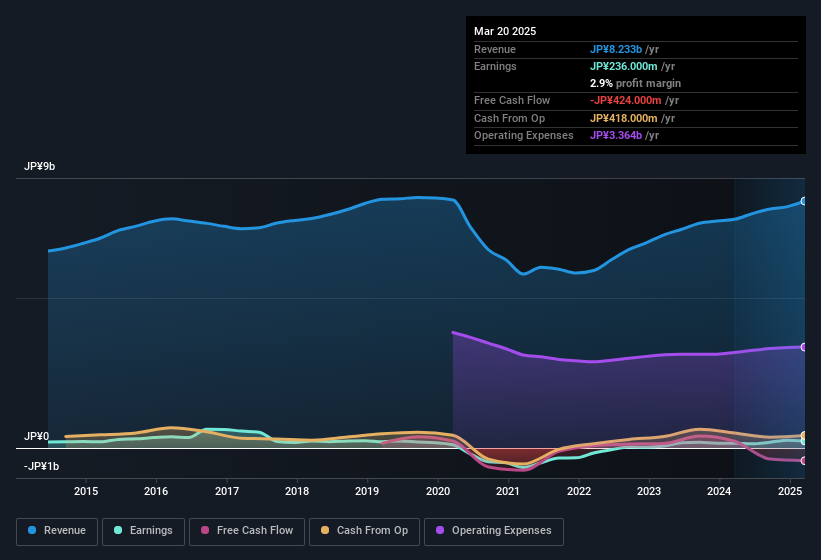- Japan
- /
- Hospitality
- /
- TSE:9950
Hachi-Ban (TSE:9950) Posted Healthy Earnings But There Are Some Other Factors To Be Aware Of
Hachi-Ban Co., Ltd. (TSE:9950) announced strong profits, but the stock was stagnant. Our analysis suggests that this might be because shareholders have noticed some concerning underlying factors.
Our free stock report includes 2 warning signs investors should be aware of before investing in Hachi-Ban. Read for free now.
Examining Cashflow Against Hachi-Ban's Earnings
One key financial ratio used to measure how well a company converts its profit to free cash flow (FCF) is the accrual ratio. To get the accrual ratio we first subtract FCF from profit for a period, and then divide that number by the average operating assets for the period. You could think of the accrual ratio from cashflow as the 'non-FCF profit ratio'.
As a result, a negative accrual ratio is a positive for the company, and a positive accrual ratio is a negative. While it's not a problem to have a positive accrual ratio, indicating a certain level of non-cash profits, a high accrual ratio is arguably a bad thing, because it indicates paper profits are not matched by cash flow. That's because some academic studies have suggested that high accruals ratios tend to lead to lower profit or less profit growth.
Hachi-Ban has an accrual ratio of 0.22 for the year to March 2025. Unfortunately, that means its free cash flow fell significantly short of its reported profits. Even though it reported a profit of JP¥236.0m, a look at free cash flow indicates it actually burnt through JP¥424m in the last year. We saw that FCF was JP¥224m a year ago though, so Hachi-Ban has at least been able to generate positive FCF in the past. One positive for Hachi-Ban shareholders is that it's accrual ratio was significantly better last year, providing reason to believe that it may return to stronger cash conversion in the future. As a result, some shareholders may be looking for stronger cash conversion in the current year.
Note: we always recommend investors check balance sheet strength. Click here to be taken to our balance sheet analysis of Hachi-Ban.
Our Take On Hachi-Ban's Profit Performance
Hachi-Ban didn't convert much of its profit to free cash flow in the last year, which some investors may consider rather suboptimal. Because of this, we think that it may be that Hachi-Ban's statutory profits are better than its underlying earnings power. But at least holders can take some solace from the 47% EPS growth in the last year. At the end of the day, it's essential to consider more than just the factors above, if you want to understand the company properly. Keep in mind, when it comes to analysing a stock it's worth noting the risks involved. For instance, we've identified 2 warning signs for Hachi-Ban (1 can't be ignored) you should be familiar with.
Today we've zoomed in on a single data point to better understand the nature of Hachi-Ban's profit. But there is always more to discover if you are capable of focussing your mind on minutiae. For example, many people consider a high return on equity as an indication of favorable business economics, while others like to 'follow the money' and search out stocks that insiders are buying. So you may wish to see this free collection of companies boasting high return on equity, or this list of stocks with high insider ownership.
Valuation is complex, but we're here to simplify it.
Discover if Hachi-Ban might be undervalued or overvalued with our detailed analysis, featuring fair value estimates, potential risks, dividends, insider trades, and its financial condition.
Access Free AnalysisHave feedback on this article? Concerned about the content? Get in touch with us directly. Alternatively, email editorial-team (at) simplywallst.com.
This article by Simply Wall St is general in nature. We provide commentary based on historical data and analyst forecasts only using an unbiased methodology and our articles are not intended to be financial advice. It does not constitute a recommendation to buy or sell any stock, and does not take account of your objectives, or your financial situation. We aim to bring you long-term focused analysis driven by fundamental data. Note that our analysis may not factor in the latest price-sensitive company announcements or qualitative material. Simply Wall St has no position in any stocks mentioned.
About TSE:9950
Hachi-Ban
Engages in the restaurant management business in Japan and internationally.
Flawless balance sheet with questionable track record.
Similar Companies
Market Insights
Community Narratives


Recently Updated Narratives


No miracle in sight


Q3 Outlook modestly optimistic


Alphabet: The Under-appreciated Compounder Hiding in Plain Sight
Popular Narratives


The company that turned a verb into a global necessity and basically runs the modern internet, digital ads, smartphones, maps, and AI.


MicroVision will explode future revenue by 380.37% with a vision towards success



